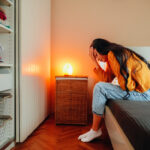Teething Tips for Sleeping: How to Help Your Baby (and Youself) Get More Rest
Healthy’s Summary
Teething can be a real sleep disruptor for babies—and their exhausted parents. The discomfort of emerging teeth often leads to fussiness, night wakings, and restless sleep. But don’t worry! There are ways to help your little one (and yourself) get some much-needed rest. Gentle gum massages, cool teething rings, and a solid bedtime routine can all work wonders. Plus, understanding when pain peaks and how to soothe it can make a huge difference.
Why Does Teething Mess with Sleep So Much?
You’ve finally gotten your baby into a decent sleep rhythm, and then—boom!—teething strikes. Why does it cause so much disruption?
Teething pain is often at its worst at night when there are fewer distractions and your baby’s body is more relaxed. Plus, lying down increases blood flow to the gums, making the discomfort even more noticeable. Some babies might wake up frequently, while others might struggle to fall asleep in the first place.
Signs That Teething Is Affecting Your Baby’s Sleep
- Frequent night wakings
- Increased drooling
- Gnawing or biting on hands, toys, or crib rails
- Fussiness and irritability, especially at bedtime
- Pulling at ears or rubbing their face
How to Help Your Baby Sleep Through Teething
- Massage Those Gums A gentle gum rub with a clean finger can help relieve some pressure. If your baby lets you, try this just before bedtime to relax them.
- Cool Relief Cold can numb sore gums, so offer a chilled (not frozen) teething ring, a cold wet washcloth, or even a silicone teether that’s been in the fridge. Just be sure whatever they use is safe and large enough not to pose a choking hazard.
- Stick to a Comforting Bedtime Routine Babies thrive on routine, and teething is no exception. A warm bath, a short massage, a cozy story, or a lullaby can all signal that it’s time to wind down. Keep the lights dim and the environment calm to ease them into sleep.
- Try a Safe Teething Remedy If teething pain is making nights unbearable, you can talk to your pediatrician about pain relief options. Over-the-counter remedies like infant acetaminophen (Tylenol) or ibuprofen (for babies over six months) may be appropriate in certain cases. Avoid teething gels that contain benzocaine, as they can be unsafe for infants (source).
- Offer Extra Comfort Sometimes, your baby just needs a little extra cuddling. If they wake up crying, a few minutes of rocking, patting, or soft singing can reassure them without fully waking them up. Avoid starting new sleep habits that might be hard to break later, like co-sleeping if you don’t already do it.
- Keep the Room Cool and Comfortable A slightly cooler room and breathable pajamas can help if your baby is running a mild teething-related fever. Overheating can make sleep even harder.
- Watch for Other Sleep Disruptors Teething often gets blamed for every bad night, but sometimes other factors—like sleep regressions, developmental milestones, or illness—are at play. If your baby’s sleep isn’t improving after teething should be settling down, consider whether something else might be going on.
When to Call the Pediatrician
If your baby is running a high fever (above 100.4°F), has diarrhea, or seems unusually irritable, it may not just be teething. Check with your pediatrician to rule out anything else (source).
Ask Healthy
The Takeaway
Teething is tough, but it doesn’t have to mean weeks of sleepless nights. By using simple soothing techniques and keeping a consistent bedtime routine, you can help your baby (and yourself) get better rest. And if things get really rough, don’t hesitate to talk to your pediatrician about safe pain relief options. Hang in there—you’ve got this!
Want to dig deeper?
Thriving as a New Mom
Caring for a newborn can be both exciting and overwhelming. “Thriving as a New Mom” is designed to support you through these early months with tailored guidance, practical tips, and a space to track your well-being. From managing sleep schedules to finding time for self-care, this program helps you balance the challenges and joys of motherhood, empowering you to care for your baby while also caring for yourself.
Enroll in one of Healthy’s Programs to log, track and learn more about your Health, one conversation at a time.
Start Program




